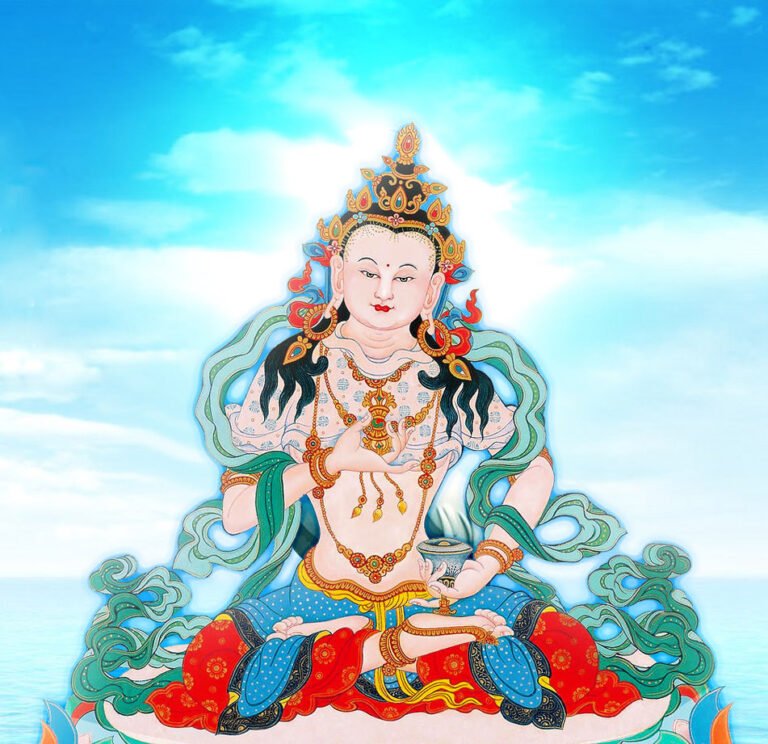Most practitioners who like to chant sutras and mantras should have a similar experience, that is, doing a lot of cultivation homework will naturally produce a feeling of tranquility. For example, many people like to chant the Buddha’s name. After reciting the Buddha’s name and reciting the associated mantra, after seven or eight hours of practice, the feeling of peace and tranquility will naturally appear. Since I rarely have such feelings, I put my heart on this peace and tranquility.
There is nothing wrong with the feeling itself. It is like how the body feels cold in winter and hot in summer. These are all caused by changes in the external environment. Because our minds have been restless for a long time due to our normal life, it will be distracted by cluttered thoughts. If the distracting thoughts do not arise, silence will appear. This is a very natural phenomenon.
Practitioners must know how to discern cluttered thoughts in the mind. Even if our minds rest in stillness, defilements still arise with the desire of practicing alone and leaving others. This is not the path to cultivate a bodhicitta mind. There is nothing wrong with the
practice of stillness of the mind, nor is there anything wrong with the external environment. What is wrong is when the mind wrongly rests on the external conditions and associated feelings. The mind wants to change the external environment, rather than change the internal state of mind in peace. We absolutely cannot settle the mind in the external environment, because it is constantly changing.
Our state of mind follows the changes of the environment, this is due to our senses following the changes of the external situation. The feelings of the physical body changes with the situation, and in turn the senses change the mind with attachment and differentiation and lead to the cycle of birth and death.
Wrongly resting in stillness will also make some practitioners want to escape from the thoughts of the masses, and mistakenly think that they can obtain peace of mind by entering the mind: Silent Nirvana. On the contrary, this deviates from the steps of the Mahayana Bodhisattva’s path and focusing only on stillness may cause one to lose the bodhicitta heart (heart of compassion), and one will not be able to attain Buddhahood. Buddha Shakyamuni once blamed the great arahart for wrongfully resting on stillness. This kind of nirvana is not the realization of liberation, but rather, we still need to practice bodhicitta to attain true realization, only then is the truly consummated liberation of enlightenment.
According to practices in the Mahayana tradition, the practitioner is required to realize the reality of the emptiness of the external environment, if the mind’s perception of feeling does not attach and grasp and change with the changes of the environment, then it is considered the achievement of peace of mind. When we come into contact with the perception of the shrines with Buddha statues, mandalas and offerings from our eyes, our mind accepts such appearance as the real phenomenon. But, the practice of mind requires us to realize that it is the external phenomenon which we make up. We use external phenomena to cultivate our mind, and that is considered the condition arising with impermanence of appearances.
So, the cultivation of non-attachment from external phenomena is a start to the path of achievement. Our six roots of ears, nose, tongue, body, mind along with their senses will be affected by the external phenomenon if we do not realize they are impermanent and an illusion. Instead, our mind views the external world as it is, to realize that the images of our consciousness arise and disappear naturally. We do not attach, differentiate, desire more feeling to its conditioned-arising.
For example, when we hear someone singing in our ears, an auditory perception will arise in our mind. This perception is the sound. Since we are used to experiencing these precepts, we add judgements, and feel it with differentiation, and desire for more from it, or discontinue with it. Both of these judgements are forms of attachment. When the sound is gone, the perception disappears, and no judgments are made in the mind. This leaves our mind conscious in the cycle of birth and death.
Therefore, we need to be very clear towards the Bodhisattvas path. Even attaining peace of mind, it’s only a state of consciousness to which we still should not attach, it is because of our practice by using the appearance of all phenomena as a mirror to find the purity of the mind. So, when realizing the truth of emptiness of phenomena, what’s left in your mind?
The practice of Mahayana Buddhism is based on the practice of percepts to find the reality of emptiness. When the six senses come into contact with the external world, we need to realize these perceptions as illusions. Although the perceptions from our senses are always there, however, we do not get attached to them, but rather, we leave them as is with no grasping of desire consciousness, and it will not trigger our consciousness to leave experiences for further attachment. So, this will reduce our judgment and differentiation and leave our mind in peace and purification. When ‘condition arising’ for charity, our consciousness of kindness leads us into action, but after doing so, the condition will diminish. It is only a matter of perception from our senses and disappears again.
The path of cultivation requires consideration of our mind with self-examination reflection. So, we will not fall into the illusion with attachment of our senses consciousness, for there is nothing that can be attached externally. The cultivation path is not only one day, it takes our every thought and action. Let us all practice diligently with the blessing from Guru and Buddhas.
By Jimmy Chang
Translated by Master Lian Zhi, Yvonne Wong, Terence Kong





